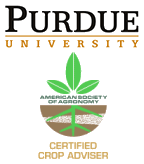
Proceedings 2007
Indiana Certified Crop Adviser Conference
Challenging Weed Species in Glyphosate-Resistant Crops
The weed spectrum encountered in agronomic production fields can change or shift in response to changes in production practices. Changes in weed spectrum can be a result of modified tillage practices, selection of herbicide-resistant biotypes, increased preponderance of species that emerge later in the growing season, and/or by introduction of species not previously encountered or considered troublesome. Since the initial commercialization of glyphosate-resistant crops in 1996, several annual weed species have become increasingly common and challenging to soybean and corn farmers. Common waterhemp (Amaranthus rudis) is a contemporary example of a weed species more common now than 20 years ago. Other weed species that can be troublesome in glyphosate-resistant cropping systems include annual morningglories (Ipomoea spp.), hophornbeam copperleaf (Acalypha ostryifolia), and common lambsquarters (Chenopodium album). Regardless of whether novel weed problems are the result of herbicide resistance or the occurrence of unfamiliar weed species, the farmer must deal with the difficulties brought about by their presence. This session will describe several weed species that can be challenging in glyphosate-resistant cropping systems and offer suggestions that may improve their management.
Aaron HagerAssistant Professor of Weed Science
University of Illinois
hager@uiuc.edu
Aaron Hager is a native of west-central Illinois, where he was raised on a corn and soybean family farm. He attended Southern Illinois University, Carbondale from 1987 - 1991 and received a B.S. in Plant and Soil Science in 1991. Aaron then went to Michigan State University and received his M.S. in weed science in May, 1993. Later that same month, he joined the University of Illinois as a weed science extension specialist. In 2001 he completed his Ph.D. in weed science, and joined the Department of Crop Sciences faculty ranks in 2002. As an assistant professor of weed science at the University of Illinois, Dr. Hager is responsible for weed biology and management research in corn and soybean production systems. His research focuses on examining the biology and management of weed species that are becoming increasingly common and problematic in Illinois. Additionally, Dr. Hager has responsibility for several extension-related weed science programs in Illinois.